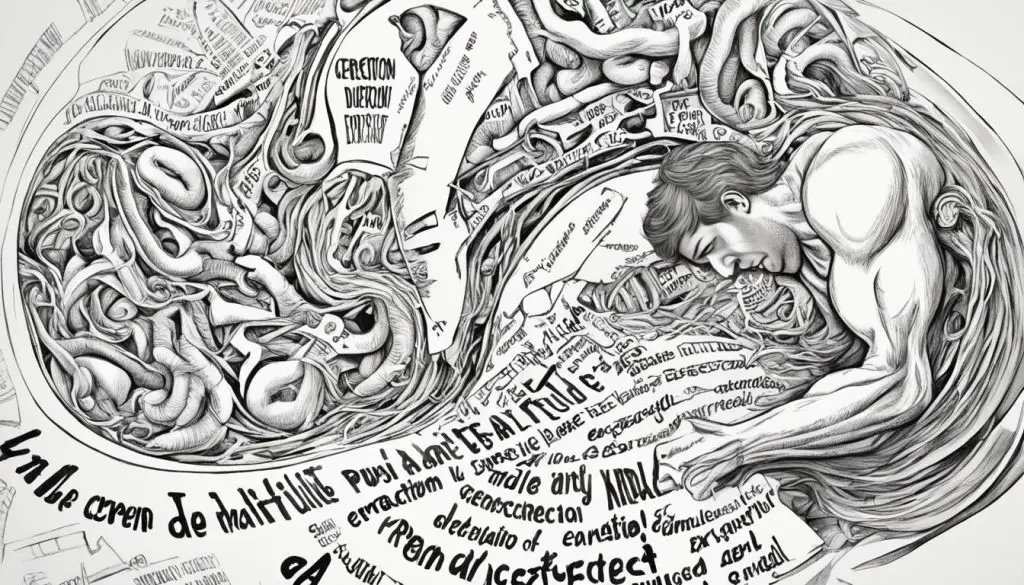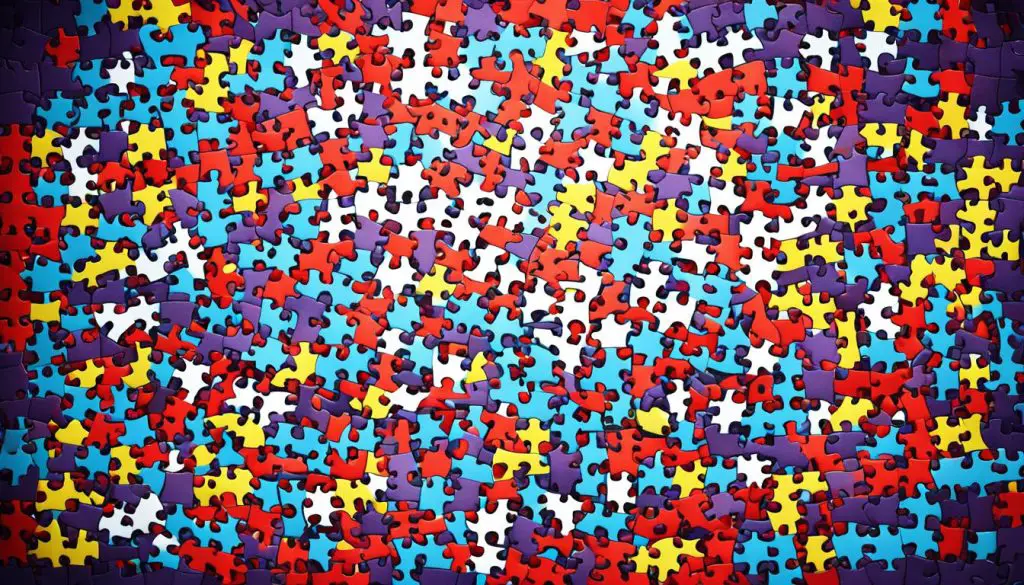Ad Blocker Detected
Our website is made possible by displaying online advertisements to our visitors. Please consider supporting us by disabling your ad blocker.
Grasping the complexity of erectile dysfunction causes can enhance your understanding of this common yet often misunderstood condition. Also known as male impotence, erectile dysfunction represents a significant health concern that manifests through persistent difficulty in maintaining or achieving an erection. If you’re grappling with the challenges of ED, acknowledging the causes of erectile dysfunction is a vital step toward seeking treatment and improving your quality of life.
Several ED risk factors intertwine in various ways, influencing the likelihood of experiencing symptoms. The roots of this condition can trace back to both physical ailments and psychological stresses. From heart disease and high cholesterol to mental health issues like stress and anxiety, the underlying causes of ED are numerous and diverse. By identifying and understanding these factors, you empower yourself in the quest to manage—and possibly overcome—this condition.
Equipping yourself with knowledge is your first line of defense. Whether you’re facing occasional hurdles or more frequent obstacles, you have options. For many, confronting this subject may feel daunting, but with today’s medical advancements, you’re far from powerless in the face of male impotence causes. It’s a matter of taking that first step and consulting with healthcare professionals who can provide personalized and effective treatment plans.
Key Takeaways
- Erectile dysfunction is more than just a sexual issue, indicating potential health conditions.
- Physical and psychological factors both play significant roles as causes of erectile dysfunction.
- Lifestyle changes and medical interventions can manage ED risk factors.
- Unraveling the underlying causes of ED is essential for targeted treatment.
- Erectile dysfunction can affect men of all ages, though it’s more prevalent in those between 40 and 70.
- Understanding the male impotence causes alleviates stigma and facilitates better healthcare conversations
Understanding Erectile Dysfunction: Basics and Statistics
When it comes to erectile dysfunction causes and the intricate web of ED risk factors, knowledge is power. Grasping the underlying causes of ED not only helps in addressing the condition but also in understanding the broad impact it can have on various aspects of life.
What is Erectile Dysfunction?
Erectile dysfunction is characterized by the persistent difficulty to achieve or maintain an erection sufficient for satisfactory sexual performance. It’s a challenge that goes beyond the bedroom, often affecting self-esteem and relationship dynamics. ED can be a warning sign of other health issues, with everything from neurological dysfunction to vascular problems playing a role.
The Prevalence Among Different Age Groups
While ED is prevalent amongst older adults, it’s a misconception that it’s only an older man’s issue. The condition touches a significant portion of the male population at various stages of life, often influenced by both physical and psychological factors.
| Age Group | Percentage Affected by ED |
|---|---|
| 20-39 | 8% |
| 40-59 | 20% |
| 60-69 | 40% |
| 70+ | 61% |
Understanding the prevalence of ED and recognizing the impact of various factors, including age, can empower you to seek help and explore treatments that can improve quality of life. Whether you’re facing the direct effects of erectile dysfunction or concerned about potential risk factors, gaining insight into this condition is a step toward wellness.
Recognizing the Symptoms of Erectile Dysfunction
Understanding the symptoms of erectile dysfunction (ED) is the first step toward identifying and addressing this common yet distressing condition. Recognizing the signs of ED can guide you toward seeking the help you need, as they can often suggest erectile dysfunction causes or even male impotence causes that may require medical attention.

Varying Degrees of Erectile Issues
Erectile dysfunction’s impact can range from mild to severe, influencing various aspects of your life. Your experiences with ED might include difficulty getting an erection, inconsistency in sustaining an erection, or in more severe cases, a complete inability to achieve an erection. These variances in symptoms underscore the importance of recognizing the severity of your condition.
Patterns and Occurrence of Symptoms
The occurrence of ED symptoms can be random or follow a specific pattern, and understanding this can provide valuable insights into erectile dysfunction causes. If you observe a recurring difficulty that aligns with certain health issues or lifestyle factors, it is crucial to consider these patterns during diagnosis and treatment planning.
| Symptoms | Occurrence | Possible Underlying Causes |
|---|---|---|
| Intermittent Erection Problems | Occasional | Stress, Fatigue, Alcohol Consumption |
| Trouble Maintaining an Erection | Frequent | Chronic Health Conditions, Medications |
| No Erection at All | Persistent | Severe Vascular Disease, Psychological Issues |
Being aware of these symptoms of erectile dysfunction is pivotal. If these signs are familiar to you, it may be time to discuss them with your healthcare provider to uncover any possible male impotence causes and take actionable steps towards your sexual health and well-being.
Physical Causes of Erectile Dysfunction
When exploring the landscape of erectile dysfunction, it is essential to consider the myriad of physical causes that can underpin this condition. Understanding these factors is not only integral for pinpointing the source of ED but also for tailoring the correct course of action for those affected.
Chronic Health Conditions Leading to ED
The connection between medical conditions causing erectile dysfunction and one’s overall health cannot be overstated. Diseases such as type 2 diabetes, which steeply elevates the risk of ED, highlight the clear link between chronic illness and sexual dysfunction. With diabetes, the risk of experiencing ED may be up to three times higher compared to those without this metabolic condition. Heart disease and high blood pressure are also significant contributors, as they can affect blood flow, a determining factor for adequate erectile function.
Conditions that warrant particular attention include:
- Chronic kidney disease
- Nerve conditions such as multiple sclerosis and Parkinson’s disease
- Endocrine disorders
- Physical damage to nerves or arteries
Additionally, any physical trauma or surgeries to the pelvic area, notably those involving the prostate or bladder, could lead to erectile concerns down the line.
Lifestyle Factors Contributing to ED
While medical predicaments certainly have their role, lifestyle factors causing ED are also pivotal elements that must be addressed. Choices such as smoking and excessive alcohol consumption have been scientifically linked to ED rates due to their detrimental effects on circulation and hormonal balance. Substance abuse, whether it is illicit drugs or prescription medication misuse, equally presents a significant threat to sexual health.
Other lifestyle influences include:
- Obesity, which can exacerbate cardiovascular issues connected to ED
- A sedentary lifestyle that limits blood flow and can contribute to other risk factors like obesity and cardiovascular disease
A proactive change in these lifestyle choices is often recommended as part of a comprehensive treatment plan for those facing ED. By modifying habits and potentially warding off chronic illnesses, one can create a more favorable environment for improved erectile function. Consider integrating regular physical activity, a balanced diet, and avoiding tobacco and excessive alcohol consumption into your daily routine for not only your sexual health but overall wellbeing.
Psychological and Emotional Drivers of Erectile Dysfunction
When addressing the complex nature of erectile dysfunction (ED), it is imperative to consider the psychological causes of erectile dysfunction, which serve as significant ED risk factors. The mind’s influence on sexual health is profound, as mental and emotional well-being directly impact sexual function. Your understanding of these underlying causes of ED is critical in seeking appropriate solutions and support.
Impact of Mental Health on Sexual Performance
Mental health challenges like depression and anxiety don’t just affect your mood—they can severely impact your sexual performance. These emotional states often result in a reduced interest in sex, impaired arousal, and difficulties in maintaining an erection. Dealing with these psychological causes of erectile dysfunction requires a holistic approach to health, encompassing both physical and mental wellbeing.
Role of Stress and Anxiety in ED
Living in a state of constant stress or experiencing high levels of anxiety can trigger a host of physiological changes that exacerbate ED. Stress hormones can interfere with sexual desire and function, making it a key player amongst ED risk factors. Managing stress and addressing anxiety is a necessary step in mitigating the underlying causes of ED, fostering a more relaxed mind and consequently, a more responsive body during intimate moments.

Unpacking the Vascular Causes of ED
When exploring the multifaceted landscape of erectile dysfunction (ED), a crucial area of focus is the influence of Vascular health on this condition. The intricate network of vessels that regulates blood flow throughout your body is fundamental to achieving and maintaining an erection. Thus, disorders affecting this system can be primary contributors to ED, highlighting the necessity to understand the vascular causes of ED and the medical conditions causing erectile dysfunction associated with it.
How Heart and Blood Vessel Health Affect Erectile Function
The heart’s role in pumping blood is pivotal, and its efficiency directly impacts erectile strength. Healthy blood vessels are equally vital, as they must relax and widen to allow an increased blood flow into the penis. When these vessels are compromised by conditions such as high blood pressure or heart disease, they can fail to function correctly, setting the stage for ED. Knowledge of one’s cardiovascular health can serve as a barometer for erectile potential and prompt proactive measures against ED.
Connections Between Atherosclerosis and ED
Atherosclerosis, the buildup of plaque within the arteries, can cause a narrowing and hardening that severely limits blood delivery. Since the penile tissues require a robust influx of blood to achieve rigidity, the relationship between atherosclerosis and ED is of great concern. It’s imperative to recognize that these vascular issues are often silent markers of underlying health conditions needing medical attention.
| Vascular Condition | Impact on Erectile Function | Frequency in ED Patients |
|---|---|---|
| Coronary Artery Disease | Reduces blood flow to the penis | Common in older adults |
| Hypertension | Impairs arterial dilation | Highly prevalent |
| Peripheral Artery Disease | Restricts blood to extremities, including the penis | Less common but significant |
| Atherosclerosis | Limits blood supply due to arterial plaque | Correlates with age and lifestyle |
Medication-Induced Erectile Dysfunction
Understanding that certain medications may lead to erectile dysfunction is crucial in managing this sensitive issue. It’s common to find that various prescriptions, while beneficial for treating specific health concerns, can have side effects impacting erectile function. Knowing which medications could be involved is the first step in addressing and potentially reversing medication-induced erectile dysfunction.
Common Medications and ED Side Effects
Many frequently prescribed medications can potentially contribute to erectile dysfunction. High blood pressure medications, for example, are known to cause ED in some individuals. This group may include beta-blockers and diuretics, which can decrease blood flow to the penis, making it difficult to achieve an erection. Antidepressants and antipsychotics, prescribed for mental health conditions, are also associated with increased risk of ED due to their impact on neurotransmitter levels. Tranquilizers can likewise lead to issues due to their relaxing effect on muscle tissue. Additionally, drugs such as appetite suppressants could decrease libido, while ulcer medications sometimes interfere with blood flow.

Managing Medication Plans to Mitigate ED Risks
If you begin to notice erectile dysfunction after starting a new medication, it’s important to speak with your healthcare provider. There are often alternatives or dosage adjustments that can be made that might lessen the impact on your sexual health without compromising your overall medical treatment. Together, you and your doctor can weigh the benefits and risks, and potentially tailor your medication plan to minimize the risk of erectile dysfunction. It’s not recommended to discontinue any prescribed medication without consulting a doctor, as this could have adverse effects on your primary health condition.
Be proactive in discussing any concerns regarding medication and erectile dysfunction with your healthcare provider to find the best course of action for your individual situation.
The Role of Age in Erectile Dysfunction
Understanding the interplay between age and erectile dysfunction (ED) is crucial for debunking common misconceptions. Many believe age to be a direct cause of ED, yet the truth is more complex. While it’s true that the incidence of ED is higher among older demographics, this is often due to an increase in age-related ED risk factors rather than age itself being the culprit.
Myth-Busting: Aging and Inevitable ED
Age-related changes in sexual function are normal, but they do not guarantee the presence of erectile dysfunction. As men get older, they may find that achieving an erection takes longer or is less firm than in their youth. These shifts, however, should not be confused as direct causes of erectile dysfunction. It’s imperative to differentiate natural changes from ED, which is typically associated with underlying health conditions that are more prevalent with advancing age.
Treatment Efficacy Across Different Age Groups
Evidence suggests that treatments for ED remain effective for men of various ages. This challenges the belief that ED treatments are less likely to work as one gets older. With options ranging from oral medications to lifestyle changes and beyond, men suffering from ED can often find a solution that restores sexual function. The key is to approach erectile dysfunction with a comprehensive understanding of one’s health and an open dialogue with healthcare providers, ensuring an individualized and successful approach to treatment.
Causes of Erectile Dysfunction
When you’re facing erectile dysfunction (ED), it’s essential to understand that its origins can be complex and multifaceted. Often, the underlying causes of ED are a weave of both physical and psychological elements. Unraveling this intricate blend is fundamental to addressing the issue efficiently.
Integrating Physical and Psychological Factors
The human body and mind maintain an intricate bond, and this connection is particularly evident in the manifestation of erectile dysfunction. Psychological causes of erectile dysfunction, such as stress or anxiety, can impede sexual performance as much as physiological concerns. It is imperative to consider the full spectrum to foster a thorough approach to treatment.
Examining Medical Conditions Commonly Associated with ED
Medical conditions causing erectile dysfunction range from cardiovascular issues to endocrine disturbances. It’s important to acknowledge that diseases like diabetes and hypertension might not only affect one’s overall health but can significantly alter sexual health.

| Physical Condition | Psychological Condition | Common Impact on ED |
|---|---|---|
| Diabetes | Depression | Can lead to nerve and blood vessel damage, reducing blood flow to the penis |
| Cardiovascular Disease | Anxiety | Affects heart function and blood circulation, vital for erection maintenance |
| Hypertension | Stress | High blood pressure can harm blood vessels, hindering erectile response |
| Obesity | Low Self-esteem | Excess weight often contributes to vascular problems and diminished libido |
Diagnostic Process for Erectile Dysfunction
When concerns about erectile dysfunction causes arise, initiating the diagnosis of erectile dysfunction is a critical first step toward restoring sexual health. The journey begins within—you assess potential symptoms and patterns, reflecting on changes in your sexual performance and health. Yet, self-evaluation is only the precursor to seeking professional help, where a more concrete determination can be made.
From Self-Evaluation to Professional Consultation
After acknowledging signs of erectile dysfunction, it’s imperative to transition from introspection to obtaining medical evaluation. Starting with a detailed discussion of your symptoms, your healthcare provider will take a comprehensive medical history and conduct a physical examination. Your openness during this stage lays the groundwork for effective diagnosis and subsequent treatment.
Comprehensive Testing Approaches
Diagnostics may extend beyond the initial consultation when underlying health conditions are considered. A blend of targeted tests will be employed to delve into the possible causes of your erectile dysfunction. This multi-faceted approach ensures a thorough and accurate diagnosis.
| Test | Purpose | What It Entails |
|---|---|---|
| Blood Tests | To check for signs of diabetes, heart disease, testosterone levels, and other health conditions. | Drawing a blood sample for laboratory analysis. |
| Urinalysis | To evaluate for underlying health problems like diabetes that may contribute to ED. | Providing a urine sample for lab testing. |
| Ultrasound | To examine blood flow to the penis and identify vascular issues calling for treatment. | Use of a wand-like device over the blood vessels that supply the penis, often stimulated by erection-inducing medication. |
| Psychological Exam | To detect depression, anxiety, or other psychological causes of erectile dysfunction. | A discussion with a mental health provider and questionnaires that assess your psychological state. |
With the insights yielded by comprehensive testing, a tailored treatment plan can be formulated to address the specific causes of your erectile dysfunction.
Conclusion
As we reach the end of our exploration into erectile dysfunction (ED), it’s clear that demystification and open discussion are indispensable tools in the journey towards management and recovery. By fostering transparent communication, we can shatter the stigma and pave the way for effective treatment of erectile dysfunction. It’s crucial to remember that ED is not an isolated issue; rather, it’s a common challenge many face and one that can be overcome with the right guidance and resources.
Demystifying ED: Encouraging Open Conversations and Treatment
Understanding ED is the first step to managing it. By proactively seeking knowledge and engaging in dialogue with healthcare professionals, you empower yourself to take control of your sexual well-being. Removing the taboos and embarrassment associated with ED allows for a more comfortable and productive conversation about symptoms, potential causes, and the multitude of treatment options available.
Moving Forward: Pathways to Managing and Overcoming ED
The road to managing and overcoming ED is paved with a diverse array of treatment options tailored to individual needs. Whether it involves medication, therapy, lifestyle adjustments, or surgical interventions, the goal is attainable with commitment and consistency. Your healthcare provider can help you navigate these options to find a holistic approach that addresses both physical and psychological factors. Approach the situation with a sense of hope and remember that managing erectile dysfunction is not a sprint but a marathon toward improved health and satisfaction.
FAQ
What are the common symptoms and causes of Erectile Dysfunction (ED)?
Common symptoms of ED include the inability to achieve or maintain an erection sufficient for sexual intercourse. Causes can range from physical factors such as heart disease, high cholesterol, diabetes, and lifestyle choices like smoking to psychological issues including stress, anxiety, and depression. Additionally, certain medications and medical conditions are known to lead to ED.
What is Erectile Dysfunction?
Erectile Dysfunction is a sexual disorder where a man experiences difficulty achieving or maintaining an erection that is firm enough for sexual intercourse. It involves a complex interaction of psychological, neurological, hormonal, muscular, and vascular processes.
How common is Erectile Dysfunction among different age groups?
ED affects a significant percentage of men, particularly those aged between 40 and 70. However, it is not restricted to older men, as younger individuals may also experience symptoms.
Can the degree of erectile issues vary?
Yes, the degree of erectile issues can range from occasional difficulty in getting an erection to a complete inability to achieve an erection at all, with varying frequencies of occurrence.
What should I observe in the patterns and occurrences of ED symptoms?
It’s important to note the frequency, duration, and situation in which ED symptoms occur, as patterns can help identify underlying causes and guide the best course of treatment.
What chronic health conditions lead to ED?
Chronic conditions that can result in ED include heart disease, diabetes, high blood pressure, chronic kidney disease, and others. Men with diabetes are particularly at higher risk, being two to three times more likely to develop ED.
How do lifestyle factors contribute to Erectile Dysfunction?
Unhealthy lifestyle choices such as smoking, excessive alcohol consumption, lack of physical activity, obesity, and illicit drug use can lead to ED by affecting cardiovascular health and hormone levels.
What impact does mental health have on sexual performance?
Mental health issues like depression and anxiety can severely affect sexual performance, often contributing to the development of ED. These conditions can reduce libido and increase performance anxiety.
What is the role of stress and anxiety in ED?
Stress and anxiety can interfere with the psychological aspect of sexual arousal, leading to ED. Performance anxiety, in particular, can create a cycle of ongoing ED issues.
How do heart and blood vessel health affect erectile function?
Vascular health is crucial for erectile function, as an adequate blood flow is necessary to achieve and maintain an erection. Conditions that impair blood flow, such as atherosclerosis and heart disease, can cause or worsen ED.
What is the connection between atherosclerosis and Erectile Dysfunction?
Atherosclerosis is a condition where the blood vessels become narrowed and hardened due to plaque buildup, which can restrict blood flow to the penis and other parts of the body, leading to erectile dysfunction.
Which common medications have side effects that can lead to ED?
Medications that can contribute to ED as a side effect include high blood pressure drugs (such as beta-blockers), some antidepressants, tranquilizers, appetite suppressants, and drugs for treating ulcers or gastrointestinal conditions.
How can one manage medication plans to mitigate ED risks?
If ED is a side effect of medication, it’s essential to speak with a healthcare provider about possible adjustments to the medication regimen or exploring alternative treatments that have less impact on erectile function.
Is Erectile Dysfunction inevitable with aging?
No, ED is not an inevitable part of aging. While the risk of ED increases with age due to other underlying health issues and slower erection responses, it can be effectively treated regardless of age.
How effective is ED treatment across different age groups?
ED treatments, including medications, lifestyle changes, and psychological counseling, are effective across various age groups, and age alone is generally not a barrier to successful treatment.
How are physical and psychological factors integrated in understanding ED causes?
ED often results from a combination of physical issues, such as cardiovascular diseases and diabetes, and psychological factors like stress, anxiety, and relationship problems. Understanding both aspects is vital for effective treatment.
What medical conditions are commonly associated with ED?
Medical conditions often linked with ED include cardiovascular diseases, diabetes, high blood pressure, hormonal imbalances, and conditions that affect blood flow.
What does the diagnostic process for ED entail?
The diagnostic process typically begins with a detailed discussion of symptoms and medical history, followed by a physical examination. If needed, the healthcare provider may request blood tests, urinalysis, ultrasound, or psychological exams to identify underlying causes.
What comprehensive testing approaches are used to diagnose ED?
Alongside physical exams and patient history, healthcare providers may use blood tests to check for hormone levels and signs of diabetes, urinalysis to rule out kidney problems, ultrasound to examine blood flow to the penis, and psychological exams to detect depression or other psychological conditions.
Does Masturbation Cause Erectile Dysfunction?
Some believe the myth about harmful effects of masturbation, including its connection to erectile dysfunction. However, there is no scientific evidence to support this claim. In fact, masturbation is a normal and healthy sexual activity that does not cause erectile dysfunction.


